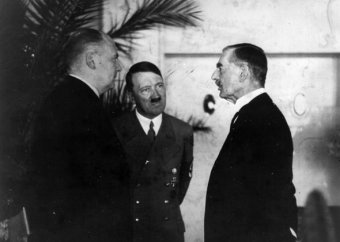
What time is it in Czechoslovakia right now?
 British Prime Minister Neville Chamberlain, right, talks to Adolf Hitler's interpreter Paul Schmidt during their conference within Hotel Dreesen at Godesberg, Germany, in September 1938. Times later, Chamberlain signed a peace agreement that, though reviled in retrospect, had been his most suitable choice at that time.
British Prime Minister Neville Chamberlain, right, talks to Adolf Hitler's interpreter Paul Schmidt during their conference within Hotel Dreesen at Godesberg, Germany, in September 1938. Times later, Chamberlain signed a peace agreement that, though reviled in retrospect, had been his most suitable choice at that time.
Picture by Fox Photos/Getty Photos, Fox Photos
Seventy-five years ago, on Sept. 30, 1938, British Prime Minister Neville Chamberlain finalized the Munich Pact, handing portions of Czechoslovakia to Adolf Hitler's Germany. Chamberlain returned to Britain to popular recognition, declaring which he had secured "peace for our time." These days the prime minister is generally portrayed as a foolish man who was simply wrong to try and "appease" Hitler—a cautionary story for any frontrunner silly enough to like negotiation to conflict.
But among historians, that see altered into the late 1950s, if the Brit federal government began making Chamberlain-era documents open to scientists. "the consequence of it was the advancement of most types of aspects that narrowed the choices of Brit federal government overall and narrowed the options of Neville Chamberlain particularly, " explains David Dutton, a British historian who penned a recently available biography of this prime minister. "The evidence ended up being so overwhelming, " he states, many historians came to think that Chamberlain "cannot do just about anything other than just what he performed" at Munich. With time, Dutton claims, "the weight of the historiography begun to move to a much more sympathetic admiration" of Chamberlain.
Initially, a glance at the armed forces situation. Many historians concur that the British army had not been ready for war with Germany in September 1938. If war had broken aside over the Czechoslovak crisis, Britain would only have had the oppertunity to deliver two divisions into the continent—and ill-equipped divisions, at that. Between 1919 and March 1932, Britain had based its army considering a “10-year rule, ” which thought Britain would deal with no significant war within the next decade. Rearmament only started in 1934—and just on a small basis. The Uk military, because existed in September 1938, had been simply not designed for continental warfare. Nor ended up being the rearmament of this Navy and/or Royal Air Force complete. Uk naval rearmament had recommenced in 1936 as part of a five-year system. And though Hitler’s Luftwaffe had repeatedly doubled in dimensions inside belated 1930s, it had beenn't until April 1938 that Brit federal government decided that its environment power could purchase as numerous aircraft since could possibly be created.
This factored into just what Chamberlain ended up being hearing from his top army advisers. In March 1938 the Uk army chiefs of staff produced a report that concluded that Britain could not possibly end Germany from taking Czechoslovakia. As a whole, Uk generals believed the army and also the nation were not prepared for war. On Sept. 20, 1938, then-Col.Hastings Ismay, assistant into Committee of Imperial Defense, delivered a note to Thomas Inskip, the minister when it comes to control of security, and Sir Horace Wilson, a civil servant. Time had been on Britain’s side, Ismay argued, writing that delaying the outbreak of war will give the Royal Air power time for you to obtain airplanes might counter the Luftwaffe, which he considered the sole chance for defeating Hitler. Uk strategists, including Ismay, thought their nation could win an extended war (provided that they'd time and energy to plan it). This is a common belief, and doubtless factored into Chamberlain's computations.
Historians disagree if the Brit military's position relative to Germany had been objectively much better in 1939 than it absolutely was in 1938. The Brit military systematically overestimated German power and underestimated its own into the lead-up into Czechoslovak crisis, then shifted to an even more positive tone into the months between Munich therefore the outbreak of war. Long lasting circumstance on the ground, it really is obvious that the Brit military’s confidence in its abilities was far higher in 1939 than it was through the Munich crisis, specially due to the growth of radar additionally the implementation of brand new fighter planes. In 1939, the armed forces thought it had been prepared. In 1938, it don't.
In this undated photo, Chamberlain suits with Hitler.
Picture by AFP/Getty Images
Chamberlain’s diplomatic options were slim aswell. In World War I, Britain's declaration of war had automatically brought Canada, Australia, and brand new Zealand in to the battle. Nevertheless the constitutional condition of the Commonwealth nations had altered inside interwar duration. In line with the Brit archives, it had been not even close to obvious that Chamberlain could depend on the backing of these countries if war broke out with Germany over Czechoslovakia. "There was truly an atmosphere that chances had been from the potential of Britain being able to prevail dealing with Germany and possibly Italy and Japan, along with not many possible allies, " Dutton says. Soviet Russia had been regarded as a potential opponent to-be feared, not a possible friend. America's neutrality laws caused it to be not likely that also a willing president could deliver the United States into the battle. There is a great amount of research when you look at the archives the British federal government had near-total disdain when it comes to security and battling capabilities of France, its only most likely major-power ally. The average extent of a Third Republic government into the 1930s had been nine months. Whenever war did bust out, Chamberlain's doubts about France's staying power proved prescient.
Nor was the Uk public prepared for war in September 1938. "you can forget that is just two decades following the end associated with the last war, " Dutton notes. British political leaders understood that the electorate would not once more willingly make sacrifices such as the ones it had made in World War I. The Somme and Passchendaele had remaining scars that however stung, and couple of, if any, Uk frontrunners had been ready to ask their particular individuals battle those battles once more. Lots of people saw the task associated with Luftwaffe into the Spanish Civil War and dreaded that aerial bombardment would make sure an additional war could be much more damaging your very first. Any method that reported to offer an alternative to delivering large armies to Europe for that reason discovered supporters on every degree of Brit community. "there was clearly a sense that any practical politician would explore every avenue to avoid war before accepting war was inescapable, " Dutton states.
If Britain had been to visit war with Hitler's Germany, many people don't might like to do therefore over Czechoslovakia. "People spoke of Czechoslovakia as an artificial creation, " Dutton claims. "The perception by the ’30s was there was clearly a challenge, it was dissolvable by settlement, so we ought to attempt. It had been perhaps not the kind of thing that will unite the country [as] a concern to visit war over."
Nor is the modern-day view of Hitler reflective of the way the Nazi dictator ended up being observed in the belated 1930s. Blitzkrieg and focus camps were not however part of the general public imagination. The British had recently been coping with one fascist, Benito Mussolini, for a long time before Hitler took power, and top Uk diplomats and military thinkers saw Hitler the way they saw Mussolini—more bravado than substance. Moreover, many Europeans thought German grievances about the settlement of World War we were genuine. We now see Hitler's activities during very early and mid-1930s as part of an implacable march toward war. Which was false at that time. German rearmament plus the reoccupation regarding the Rhineland seemed unavoidable, because maintaining a large country like Germany disarmed for many years ended up being impractical. Hitler's merging of Austria and Germany appeared to be exactly what numerous Austrians desired. Even needs for chunks of Czechoslovakia had been seen, at the time, as definitely not unreasonable—after all, numerous Germans lived-in those places.
So, whenever Chamberlain came back from Munich using development that he had negotiated a comfort agreement, cheering crowds of people loaded the roads together with hit rejoiced.
RELATED VIDEO


Share this Post
Related posts
What time is it in Prague?
“Prague never enables you to get. That dear little mama has claws.” Therefore wrote Franz Kafka, among the Czech Republic’s…
Read MoreWhere to Visit in Prague?
The inexpensive Czech beer and regular glasses of steaming mulled wine comprised the shortcomings though. Nonetheless, I…
Read More










